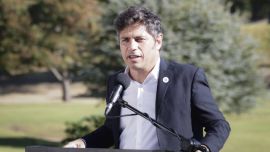At 276.2 percent, Argentina in February topped global inflation rankings for the third consecutive month. Yet the country is not even close to being considered the most insecure nation. Even by the standards of the Americas, the region that is home to the highest homicide rates, public security is typically not a major issue for anybody when considering whether to invest in Argentina. Nevertheless, inflation and crime are at the top of President Javier Milei’s agenda, though the former is well ahead of the latter. Both, however, will test his libertarian approach to problem-solving.
Milei does not appear at first glance to have a security agenda. His two appointees for the top jobs in this area, Security Minister Patricia Bullrich and Defence Minister Luis Petri, date back to his attempt to bring the losing Juntos por el Cambio presidential ticket into his Cabinet after winning the run-off last November. He had initially promised control of those two portfolios to Vice-President Victoria Villarruel, who has been cultivating a political profile of her own since Milei failed to meet their pre-electoral pact.
The images last weekend of a hooded young man in Rosario, walking calmly into a service station and firing at another young man working there, in cold blood, were so shocking that it demanded some sort of action from the national government. “It is us or them,” posted Milei on X.
Action didn’t amount to much though, and while Bullrich went to town to deliver an extra dose of federal forces, President Milei was already saying in an interview back in Buenos Aires that each provincial government was responsible for public security in its area. That line of course triggered the immediate reaction from the nation’s provincial governors, all of whom signed a statement declaring the Rosario crisis to be “a federal problem.”
Milei dithers between action and attacking problems or being loyal to his libertarian laissez-faire principles. His government does not seem willing to launch a federal-led, heads-on war on narco activity, which has its epicentre in Rosario but ramifications for every region in the country, including Buenos Aires City. He believes, after all, that the State itself is “a criminal organisation.”
In this case, Milei’s anarcho-liberalism fits well with a sour well-established reality. For decades, criminal activity in Argentina has operated under two premises: one, a collective complicity that involves gangs, police and the political establishment and; two, an implicit agreement that only certain levels of violence are tolerable. This applies to all types of crime, small and big: car stereo theft or car theft more generally, mobile phone robberies, prostitution and also drug-dealing. The formula is simple: every time any of these delicate pacts is broken, there is a violent act that shocks the public – a mafia-style payback. When the settlement is restored, things go back to a liveable version of normality.
A United Nations global study on homicide describes this as a “pax mafiosa,” defined as: “criminal organisations enter into ‘gentlemen’s agreements,’ including with state authorities, precisely for the purpose of avoiding violent confrontations, even if this effectively leads to the authorities ceding control of some local jurisdictions.”
Be it a conscious decision or just a natural reflex, Milei may stop stop short of a war on organised crime that could have massive costs in human lives or human rights – they have elsewhere in Latin America (Colombia, Mexico, more recently El Salvador). Things in Rosario are likely to settle down once the new administration of Governor Maximiliano Pullaro (a member of the centrist Unión Cívica Radical party who is taking charge after four years of a Peronist governor and 12 years of Socialist administration) finds its own way into the ingrained deep state of illegal activity (which, by the way, does not only trade in illicit drugs but also in undeclared farming produce from the country’s main port, among other things).
But Milei does not have the luxury of losing the grip on his war on inflation. The president celebrated February’s rate of 13.2 percent (down from the 20.6 percent recorded in January and December’s 25.5 percent), but still noted that “March will be very complicated.” He ordered Economy Minister Luis Caputo to meet food companies and supermarkets representatives and, ultimately, to give benefits for those who import food. Inflation recidivism is the worst thing that can happen to Milei in the next quarter and even his liberal mind can look into unorthodox ways to battle it. One is to keep the official exchange rate artificially low to extend the “pax cambiaria” as an anchor. Argentines tend to relax a bit when the greenback seems under control.
Can the cure be worse than the illness? With the pax cambiaria creating inflation in dollars, the public may find it increasingly difficult to have enough cash to buy enough food. News articles are already appearing showing that some items cost more here than in Paris. During his incursions on social media, the President and his team should search for the news in Nigeria this week, where food looting has been reported across Africa’s most populous nation after food inflation hit 35 percent (annual) at the start of the year. In Argentina, food prices have gone up double that in just the months since Milei took office.
* Marcelo J. García is a political analyst and Director for the Americas for the Horizon Engage political risk consultancy firm.





















Comments